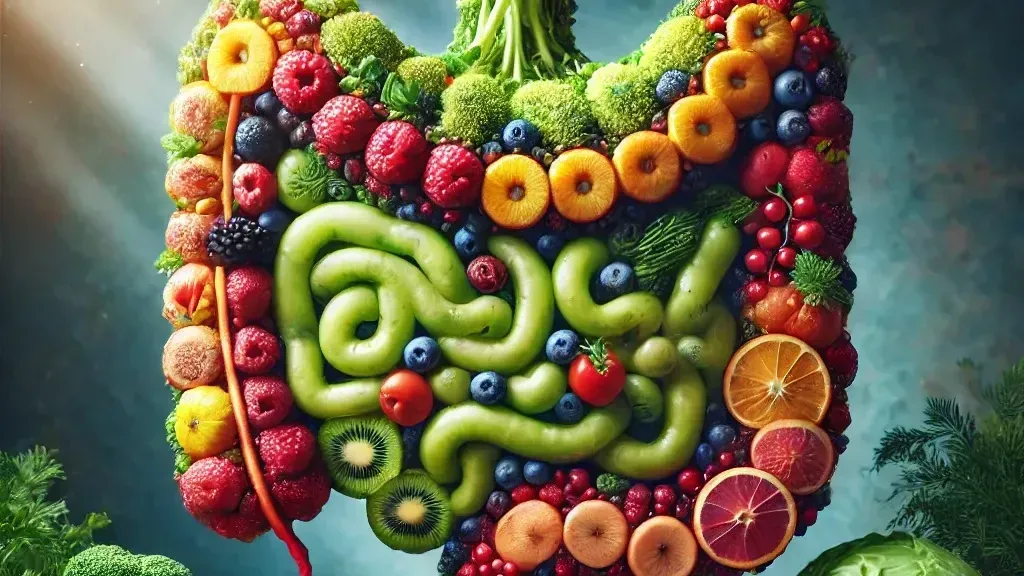The Gut Microbiome with Dr. Justin Sonnenburg
Did you know trillions of microorganisms live in your gut, shaping your mood, immunity, and more? What defines a healthy microbiome? Explore this inner world with Dr. Justin Sonnenburg and uncover the secrets to gut health!

Did you know that trillions of microorganisms living in your digestive tract might hold the key to your overall health? The gut microbiome, composed of bacteria, viruses, and fungi, plays a critical role in regulating hormonal balance, brain health, and immune system function. It’s a hidden ecosystem that directly influences how we feel, think, and even fight off illnesses.
Dr. Justin Sonnenburg, a professor of microbiology and immunology at Stanford School of Medicine, has been at the forefront of groundbreaking research on the gut microbiome. His findings underscore its immense impact on everything from immunity to emotional well-being.
Understanding this complex network could unlock new ways to boost your health and vitality. Whether you’re seeking to enhance mental clarity or improve your body’s defenses, exploring the science behind the gut microbiome might just change the way you care for yourself.
Understanding the Gut Microbiome
The gut microbiome is a complex and fascinating ecosystem composed of trillions of microorganisms that reside throughout the entire digestive tract, not just the stomach. This microbial community includes bacteria, archaea, eukaryotes, fungi, and viruses, each contributing to critical bodily functions such as digestion, immunity, and even mental health. Remarkably, these microorganisms are not randomly distributed but are organized spatially, inhabiting specific niches like crypts and folds within the digestive tract. This organization supports a balanced and efficient microbial environment, ensuring the smooth functioning of the gut.
The development of the gut microbiome begins at birth. While fetuses are sterile in the womb, the process of microbial colonization starts during delivery. The mode of birth plays a significant role: babies born vaginally are exposed to a different microbial profile than those delivered via cesarean section. Similarly, whether a newborn is breastfed or formula-fed can significantly shape the composition of their microbiota. Other factors, such as early exposure to antibiotics or living with pets, further influence the microbiome’s development. These early years are crucial, as disruptions during this period—such as an overuse of antibiotics—can lead to long-term health challenges, including immune and metabolic disorders.
What constitutes a “healthy” gut microbiome is not one-size-fits-all. The idea of health depends on various factors, including genetics, diet, and lifestyle. Interestingly, microbiomes found in traditional populations, such as hunter-gatherers or rural agricultural communities, tend to be richer in diversity compared to those in urbanized societies. These traditional microbiomes may better reflect the ancestral conditions in which human gut ecosystems evolved, shaped by diets rich in fiber and low in processed foods.
A key feature of the gut microbiome is its resilience. Despite being influenced by diet, illness, or environmental changes, the microbiome often resists drastic shifts and tends to stabilize over time. This resilience underscores its importance in maintaining overall health and adaptability to challenges.
Understanding the gut microbiome requires more than cataloging its components; it involves appreciating its dynamic relationship with our body and environment. By fostering a healthy microbiome through mindful lifestyle choices, we can unlock the potential for better physical, mental, and emotional well-being. The gut microbiome truly is a universe within, vital to our health in ways we are only beginning to understand.
Insights from Dr. Justin Sonnenburg on Gut Health and Wellness
In a recent discussion, Dr Sonnenburg, shared valuable insights into the microbiome— these microbes are essential for hormonal health, brain function, and immune system regulation, underscoring their importance to our overall well-being.
When asked to define the microbiome, Dr. Sonnenburg described it as the vast community of bacteria, fungi, viruses, and other microorganisms that coexist within our digestive system. Far from being passive, these microbes actively influence our immune system, modulating its responses and shaping its functionality.
The microbiome fundamentally alters how our immune system operates
The benefits of a high-fiber, plant-based diet combined with fermented foods like yogurt, kimchi, and sauerkraut. These dietary components not only promote microbial diversity but also help produce short-chain fatty acids, compounds known to reduce inflammation and support brain health.
The impact of behaviors and environmental factors on the microbiome, interactions with others, pets, and nature introduce new microbes that enrich our gut ecosystem. Even mood and stress levels can influence the microbiome, illustrating the profound connection between mental and physical health.
The gut and brain are in constant communication
In response to questions about fermented foods and fiber, their vital role was affirmed in fostering a healthy gut. \
Fermented foods boost microbial diversity, while fiber serves as essential fuel for beneficial bacteria
Understanding a Healthy vs. Unhealthy Microbiome
The health of your gut microbiome, a community of trillions of microorganisms, is a dynamic concept, shaped by unique factors like diet, behavior, and environment. What’s healthy for one person may not be for another, emphasizing the importance of context.
Interestingly, the microbiomes of traditional populations, such as hunter-gatherers and rural agricultural communities, offer a glimpse into our ancestral gut health. These groups typically have diverse microbiota, shaped by natural diets and minimal exposure to modern processed foods. In contrast, Westernized diets and lifestyles have led to reduced microbial diversity, often linked to various health issues.
One of the microbiome’s remarkable traits is its resilience. Even when disrupted by antibiotics, poor diet, or stress, it tends to resist change and gradually return to a stable state. However, chronic exposure to harmful factors can weaken this resilience, leading to an unhealthy microbiome.
Diet plays a pivotal role in shaping the gut’s microbial environment. High-fiber, plant-based diets are particularly beneficial, as they feed gut bacteria and promote the production of short-chain fatty acids, which improve digestion and reduce inflammation. On the other hand, heavily processed foods disrupt the microbiome, fostering an environment that encourages harmful bacteria to thrive.
Behavior and lifestyle also significantly impact gut health. Interacting with pets, spending time outdoors, and even hugging others can introduce beneficial microbes, enriching the microbiome. Furthermore, mood and internal reactions create a feedback loop, where the gut influences mental health and vice versa. Chronic stress or negative emotions can disrupt the gut’s delicate balance, while mindfulness and positive interactions help nurture it.
For those seeking practical tips to support a healthy microbiome, small, consistent changes can make a big difference:
- Avoid processed foods: Limit your intake of ultra-processed snacks and meals, regardless of your dietary preferences.
- Increase fiber intake: Incorporate a variety of fruits, vegetables, legumes, and whole grains into your meals.
- Engage in microbiome-friendly behaviors: Spend time with pets, explore nature, and foster meaningful human connections.
Your microbiome is a reflection of your lifestyle, diet, and interactions. By making informed choices, you can cultivate a diverse and resilient microbiome, laying the foundation for long-term physical and mental health.
Navigating Artificial Sweeteners, Plant-Based Alternatives, and Dietary Strategies
When it comes to sweeteners, there’s a distinct difference between artificial and plant-based options. Artificial sweeteners like saccharin, sucralose, and aspartame are chemically engineered in laboratories, while plant-based sweeteners such as stevia come from natural sources. Despite their common use, the long-term health impacts of artificial sweeteners remain a topic of concern. Many people find these sweeteners convenient for reducing calorie intake, but research on their effects on gut health and the microbiome is still ongoing.
In contrast, plant-based sweeteners, although still not widely researched, may offer a more natural alternative. Stevia, for instance, is intensely sweet but requires only a small amount to achieve the desired level of sweetness. This may make it less likely to disrupt gut health compared to its artificial counterparts. However, while the current research on plant-based sweeteners is limited, they may be considered a better option for those looking to avoid the potential negative effects of artificial chemicals on the body.
Dr. Sonnenburg personally avoids artificial sweeteners due to concerns about their potential impact on gut microbiota and overall health. However, he stresses the importance of moderation and gradual dietary changes. Instead of making drastic shifts, it’s more beneficial to implement small adjustments that can be sustained over time, allowing the body to adapt and maintain a healthy balance.
Another area of discussion is the necessity of fasting or cleansing before attempting to repopulate the microbiome. Dr. Sonnenburg emphasizes that it is not necessary to go on a cleanse or fast before making dietary changes. In fact, wiping out the microbiome without proper knowledge could be counterproductive. The key to supporting gut health is a steady, informed approach rather than drastic, temporary measures.
Recent studies on fiber and fermented foods also shed light on their impact on the microbiome. A study compared the inflammasome response of individuals who consumed different amounts of fiber and fermented foods. The findings revealed that fermented foods had a more significant impact on increasing microbiota diversity and reducing inflammation than fiber alone. This reinforces the idea that a balanced approach, incorporating both fiber and fermented foods, can provide significant benefits for gut health.
For a healthy microbiome, the best approach remains consistent: avoid heavily processed foods, consume fiber-rich, plant-based diets, and engage in positive behaviors that promote a healthy environment for your gut microbiota. Simple actions, such as interacting with pets or even hugging, can introduce beneficial microbes that support a thriving microbiome. These small, sustainable steps can have lasting impacts on overall health.
Laura's Journey to a Healthy Microbiome and Gut Health
Laura, a 32-year-old marketing professional, had always struggled with digestive issues, chronic bloating, unpredictable stomach pains, and low energy. Despite trying countless diets and medications, nothing seemed to offer lasting relief. She often found herself feeling frustrated and hopeless, convinced that her digestive troubles were just something she’d have to live with. Everything changed when Laura met with a nutritionist who introduced her to the concept of gut health. She learned that her microbiome, the community of trillions of microorganisms in her digestive system, was likely out of balance. Her high intake of processed foods, sugary snacks, and lack of fiber were contributing to her gut’s dysfunction.
Motivated to take control of her health, Laura began to make small but impactful changes. She swapped out processed foods for fiber-rich vegetables, whole grains, and added fermented foods like kimchi and sauerkraut to her diet. Within weeks, Laura noticed significant improvements. Her bloating diminished, her energy levels soared, and she felt more mentally clear and focused.
Her mood lifted, and for the first time in years, she didn’t feel like her gut was working against her. But Laura soon realized that gut health wasn’t just about what she ate, it was a holistic approach. She made sleep a priority, practiced stress-relieving techniques like yoga, and spent more time outdoors. These lifestyle changes, paired with a gut-friendly diet, transformed her overall well-being.
Today, Laura feels empowered, knowing that taking care of her microbiome has not only improved her digestion but also her mental and physical health. Her journey is a testament to the profound impact that small, consistent changes can have on gut health and how it can truly transform one’s life.
Your Top Questions Answered
What is the gut microbiome?
The gut microbiome refers to the vast community of trillions of microorganisms, including bacteria, fungi, viruses, and archaea, that reside in our digestive system. These microorganisms play a crucial role in digestion, immune function, and even mental health. Maintaining a balanced microbiome is essential for overall health and well-being.
How does the microbiome affect digestion?
The microbiome is essential for breaking down complex foods, particularly fibers that the human body cannot digest on its own. It also helps produce vitamins, regulate bowel movements, and prevent harmful pathogens from entering the body. A balanced microbiome promotes efficient digestion and supports a healthy gut environment.
Can the microbiome impact mental health?
Yes, the gut microbiome has a direct influence on mental health through the gut-brain axis. The microbiota in the gut can produce neurotransmitters like serotonin and dopamine, which affect mood, stress levels, and mental clarity. Imbalances in the microbiome have been linked to conditions like anxiety, depression, and even cognitive disorders.
How can I improve my gut health?
A healthy diet rich in fiber, fermented foods, and prebiotics can support a diverse and balanced microbiome. Avoiding excessive processed foods, reducing stress, and maintaining regular physical activity are also key factors in promoting gut health. Staying hydrated and ensuring proper sleep further supports gut function.
What foods are good for the microbiome?
Foods rich in fiber, such as whole grains, fruits, and vegetables, nourish beneficial gut bacteria. Fermented foods like yogurt, kefir, kimchi, and sauerkraut introduce healthy bacteria to the gut. Prebiotic-rich foods like garlic, onions, and bananas help stimulate the growth of beneficial microbes, contributing to a balanced microbiome.
Key Takeaways
Gut Microbiome: The gut microbiome consists of trillions of microorganisms that play a vital role in digestion, immune function, and mental health, influencing overall well-being.
Development: The microbiome’s development begins at birth, influenced by factors like birth method, diet, and environmental exposures, which can have long-lasting effects on health.
Individuality: A healthy microbiome varies from person to person, shaped by diet, genetics, and lifestyle, highlighting the importance of context in determining gut health.
Traditional Diets: Traditional populations, such as hunter-gatherers, have more diverse microbiomes, often due to their natural, fiber-rich diets and minimal exposure to processed foods.
Resilience: The microbiome is resilient and can bounce back from disruptions, but chronic exposure to poor diets or stress can weaken its balance, leading to health issues.
Diet: A high-fiber, plant-based diet supports gut health by nourishing beneficial bacteria and promoting the production of short-chain fatty acids that reduce inflammation.
Fermented Foods: Fermented foods like kimchi, yogurt, and sauerkraut boost microbial diversity, contributing to a healthier gut and improved digestion.
Behavioral Impact: Behavioral factors, such as interacting with pets, spending time outdoors, and managing stress, can introduce beneficial microbes and enhance microbiome health.
Sweeteners: Artificial sweeteners may disrupt gut health, while plant-based alternatives like stevia may be a healthier option, although more research is needed.
Lifestyle Changes: Consistent, small lifestyle changes, such as avoiding processed foods and prioritizing gut-friendly foods and behaviors, can significantly improve microbiome health and overall well-being.
Conclusion
The gut microbiome is an essential and complex ecosystem that profoundly influences our overall health, from digestion to mental well-being. As we’ve explored, a balanced microbiome plays a pivotal role in immune function, brain health, and disease prevention. Understanding the microbiome and how it works empowers us to make informed decisions about our diet, lifestyle, and habits, fostering better long-term health outcomes.
The science behind the microbiome highlights the importance of a high-fiber, plant-based diet, rich in fermented foods, and a lifestyle that promotes microbial diversity. Small, sustainable changes, such as reducing processed foods, engaging in positive behaviors, and managing stress, can significantly impact gut health. While much is still to be learned about the microbiome, the growing body of research shows that nurturing this microbial community can enhance both physical and mental health. Whether it’s making mindful food choices or incorporating healthy habits, optimizing your microbiome can lead to a healthier, more vibrant life.
By understanding the microbiome’s importance and taking steps to support its health, we can unlock its full potential, improving our well-being and overall quality of life.
References
https://sonnenburglab.stanford.edu/
https://pubmed.ncbi.nlm.nih.gov/35105664/
https://www.frontiersin.org/journals/microbiology/articles/10.3389/fmicb.2022.999001/full
https://gut.bmj.com/content/71/5/1020
https://pmc.ncbi.nlm.nih.gov/articles/PMC10989414/
https://www.hubermanlab.com/episode/dr-justin-sonnenburg-how-to-build-maintain-and-repair-gut-health
https://pubmed.ncbi.nlm.nih.gov/34256014/
https://www.annualreviews.org/content/journals/10.1146/annurev-physiol-031522-092054
https://link.springer.com/article/10.1007/s10482-020-01474-7
https://awcim.arizona.edu/podcast/episode09_Sonnenburg.html
https://sonnenburglab.stanford.edu/press.html
This article was written by Lucía Romero Lastra, a seasoned writer and editor with expertise in crafting engaging and informative articles




